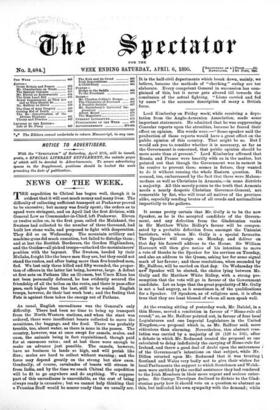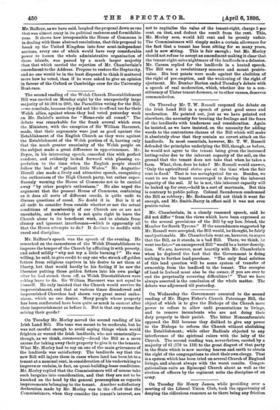At the evening sitting of yesterday week, Mr. Dalziel, in
a thin House, moved a resolution in favour of "Home-rule all round," or, as Mr. Balfour pointed out, in favour of four local Legislatures and one Imperial Legislature in the United Kingdom,—a proposal which is, as Mr. Balfour said, more ridiculous than alarming. Nevertheless, this abstract reso- lution was carried by a majority of 26 (128 to 102), after a debate in which Mr. Redmond treated the proposal as one calculated to delay indefinitely the carrying of Home-rule for Ireland, and threw a good deal of doubt upon the seriousness of the Government's intentions on that subject, while Mr. Dillon retorted upon Mr. Redmond that it was treating t Scotland and Wales very badly not to give their wishes for local Parliaments the support to which Scotch men and Welsh- men were entitled by the cordial assistance they had rendered to the Irish Members in their more urgent and serious enter. prise. Sir George Trevelyan declined to dictate to the Glad- Estonian party how it should vote on a question so abstract as this, but indicated his own sympathy with the demand; while
Mr. Balfour, as we have said, laughed the proposal down as one that was almost crazy in its political rashness and formidable- ness. It shows bow irresponsible the House of Commons is in dealing with these abstract resolutions, that this proposal to break up the United Kingdom into four semi-independent sections, every one of which wsuld have very considerable power to loosen the whole administrative organisation of these islands, was passed by a ranch larger majority than that which carried the rejection of Mr. Chamberlain's amendment to the Address. Propose to restore the Heptarchy, and no one would be in the least disposed to think it mattered more how he voted, than if he were asked to give an opinion in favour of the Oxford or Cambridge crew for the University Boat-race.







































